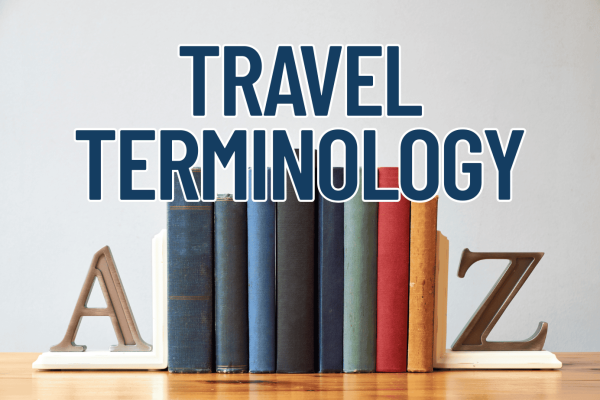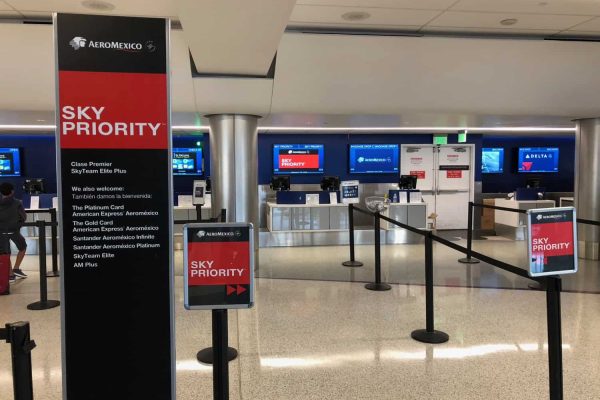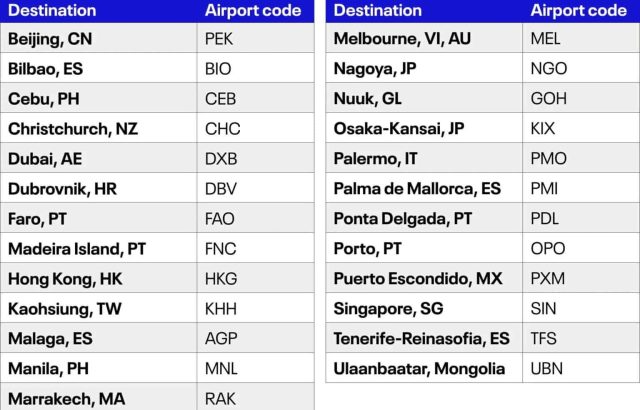Let’s face it: the travel world comes with its own language sometimes. Whether you’re chatting with a flight attendant, checking into a boutique hotel, or navigating an airline booking page, you’re bound to encounter some head-scratching travel terminology. So, let’s clear up the confusion, one term at a time!
Here’s your go-to A to Z glossary of essential travel language — both beginner and advanced — so you can jet-set like a pro. 🧳🌍
This site is part of an affiliate sales network and receives compensation for sending traffic to partner sites. This compensation may impact how and where links appear on this site. This site does not include all financial companies or all available financial offers. See below for full disclosures.

Want to earn free travel? Learn more about one of my favorite credit cards to get started!
Why You Need to Know Travel Terminology
Traveling opens us up to a world of adventure, discovery, and joy. But let’s be honest, sometimes it also introduces us to a whole new language. From the moment you book your flight to your final check-out at a hotel, you’re likely to encounter some travel language that sounds more like insider code than everyday lingo.
Whether you’re booking your first solo trip or planning your tenth international escape, understanding common travel terminology can save you time, money, and stress. It boosts your confidence and helps you make smarter decisions every step of the way. For example, knowing what “dynamic pricing” or an “open-jaw ticket” is can save you hours of confusion and potentially hundreds of dollars.
Consider this your personal glossary — your cheat sheet to travel talk that demystifies everything from airline lingo to hotel hacks. These quick definitions will empower you to navigate bookings, borders, and baggage claims like a pro!
The A's
Airline Alliance: Groups of airlines (like Star Alliance or OneWorld) that share routes, lounges, and frequent flyer perks. You may have noticed this when booking through one airline, only to see a different airline operating the gate and branding on the plane.
Airport Lounge: Private airport areas offering food, drinks, Wi-Fi, and comfy seating, often included with certain credit cards or elite statuses. You can also sign up for membership with services like Priority Pass to gain access.
Airside: The secure area of an airport past security and passport control. You must be either airport staff, airline crew members, or someone with a valid boarding pass to enter this area.
All-Inclusive: A vacation package that includes lodging, food, drinks, and sometimes activities.
The B's
Boutique Hotel: A stylish, smaller property (usually under 100 rooms) offering personalized service and curated design. Think charm over chain.
Boarding Group: The number assigned to your boarding order. A lower number equals earlier access to overhead bins. If you have the chance, check in for your flight as soon as you can or consider paying a small fee for a better boarding group.
Buffer Day: An extra day in your itinerary to accommodate unexpected delays. This is especially important if you have plans that can’t be delayed or altered.
Bumping: When you’re denied boarding due to overbooking. The first passengers bumped are typically those who checked in late, booked a basic fare class, or haven’t had their seat assigned yet. Involuntary bumping comes with compensation, so be aware of your rights and prepare yourself if this ever happens to you.

The C's
Carry-On: A small suitcase or bag you bring onto the airplane, also called in-cabin luggage. Sizes vary by airline, but it should fit in the overhead bin (and ideally under your seat if you’re in economy with no extra perks). This is one of my favorite carry-ons!
Checked Baggage: Luggage that is handed over at check-in and stored in the aircraft’s hold. During international layovers, you may need to collect this item for customs purposes before returning it to be loaded onto the next flight. This is one of my favorite checked suitcases!
Codeshare: When two or more airlines share the same flight. Two airlines selling the same flight under different flight numbers is great for mileage accrual and more connecting options. This is also related to airline alliances (discussed above), when you book through one airline and end up flying another.
Customs Declaration: A form detailing what you’re bringing into a country, especially for duty/tax purposes. Do your best to fill this out completely and have it ready to hand over to a customs officer when you step up to their desk.
The D's
Dynamic Pricing: Airfare or hotel prices that change in real-time based on demand. Translation: Book early or risk paying more! However, it’s also possible to book too early. It’s best to use flight trackers like Skyscanner and Daily Drop Pro to find the best time to book.
Direct Flight: A flight that makes one or more stops but doesn’t require you to change planes. This one is not to be confused with a non-stop flight!
Duty-Free: Shops that sell goods exempt from local import tax. It’s hard to miss this in airports, especially when you fly into a major international airport. If you purchase items from here, you must ensure they remain unsealed or tampered with in any way.
The E's
Electronic Visa (e-Visa): A digital visa you apply for online before entering a country. This is way more convenient and faster than embassy visits, which is how it used to be done. You should always look up the visa requirements when you book a trip to a different country.
Eco-Tourism: Responsible travel to natural areas that conserve the environment. Thankfully, this is a growing trend. The goal is to move away from overtourism and travel in a way that ensures the places we love to visit will be there for many years to come.
ETIAS: A new European travel visa waiver required for U.S. citizens starting in late 2026. It stands for “European Travel Information and Authorisation System.” You can check the official website for updates and requirements.
eSIM: A convenient and affordable way to stay connected online while traveling abroad. My favorite eSIM is Holafly, and I’ve found that 9 times out of 10, it’s way cheaper than the international plan offered through my phone carrier.

The F's
FAM Trip: Short for “familiarization trip.” Tourism boards or travel brands often host these to introduce destinations to media, travel agents, and influencers (hello, dream gig!).
Fare Class: The letter code on your ticket (like Y, J, or Q) that determines your seat type, baggage allowance, and upgrade eligibility. Use this letter to google what your seat type is. For example, not every business or first class seat is the exact same.
Fast Track: Priority access at airport security or immigration. You can get fast track access through your fare class (like business or first class), frequent flyer status, or a pre-approved program such as TSA Pre-Check or Global Entry.
Foreign Transaction Fee: A surcharge added to purchases made abroad on some credit cards. If you travel frequently, consider getting a credit card that has low or no foreign transaction fees. Those few cents can add up over time!
The G's
Gate Check: When your carry-on bag is taken at the boarding gate to be stored in the cargo hold. This is typically done to roller bags because the flight crew knows the overhead bins will fill up. This service is free, but pack your essentials separately just in case. It’s often out of your control when this happens.
Glamping: Glamorous camping with luxury amenities. What a great way to travel in laidback luxury! I’ve done some awesome glamping trips and highly recommend this experience.
Global Entry: A trusted traveler program that gives you expedited customs clearance when returning to the United States. Yes, it’s worth every penny. Have you seen how long those customs lines can get?!
Green Travel: Eco-conscious travel choices like low-emission transport, local stays, and sustainable tours.
Your FREE Carry-On Bag Travel Guide
Pack smarter and more efficiently with this FREE carry-on bag travel guide. Learn how to pack essentials, keep electronics safe, and more on your next travel adventure!
The H's
Hotel Transfer: Transportation arranged to get you to and from your hotel, typically between the airport and your hotel. It can be a luxury private car or a shared shuttle with multiple stops. Many hotels offer this service, either included or for an additional fee, so be sure to ask when booking your accommodations.
Hostel: Budget accommodation, often with shared rooms and communal spaces. Not all hostels are what they used to be. Some of them are actually fairly nice these days, with restaurants or bars downstairs and easy access to the city center. You can also sometimes book a private room at a hostel.
House Sitting: A way of traveling for less by exchanging house or pet sitting services in exchange for free or discounted accommodation. TrustedHousesitters is one of my favorite ways to do this. You can stay in amazing homes all over the world for a small membership fee – and take care of cute animals, too! Use my discount code, ABUNDANT25, for 25% off new memberships.
Hub Airport: A major airport used as a transfer point by an airline (e.g., Dallas is a hub for American Airlines and Atlanta is a hub for Delta). This is helpful for route planning and also explains why you might always have a layover in a certain city.
The I's
IATA Code: The three-letter airport code you see on your luggage tag. For example, LAX is for Los Angeles International Airport, CDG is for Charles de Gaulle Airport in Paris, JFK is for the John F. Kennedy International Airport in New York, and MIA is for Miami International Airport. They’re like secret codes for the wanderlust pros (and a great tattoo idea, if that’s your thing!).
Immigration: The process of entering a foreign country, often involving passport checks and visas. Always make sure you know what the immigration process is when you enter another country. Even if you’re only passing through on a layover, you may have to go through some kind of border check (but not always).
Interline Agreement: Cooperation between airlines to handle passengers across multiple carriers. This is different from a codeshare flight because these two airlines do not have a partnership agreement. Interline flights are when you are flying multiple unrelated airlines for one trip, but they agree to handle your check-in and baggage until your final destination.
Itinerary: A schedule of plans, including travel, accommodations, tours, and more for a specific trip. It’s a good idea to put together at least a general itinerary when planning a trip. This helps you narrow down activities based on how much time you have in a day and keeps all your important reservations in one place. My favorite ways to plan my itinerary are by using Steller and Viator.

The J's
Jet Lag: That foggy-headed fatigue caused by flying across time zones. This happens because your internal rhythm gets disrupted, such as your eating and sleeping schedules. Pro Tip: Hydrate and move around as much as you can on the flight, avoid caffeine in-flight, and try to adapt to the local time zone on day one. (See more of my tips on this here and here.)
Junket: A promotional trip, often paid for by a third party. This is similar to a FAM trip, but a junket is typically related to free or low-cost trips organized for members of the press/media to promote a destination or service.
The K's
Keycard Wallet: A lifesaver for storing hotel keycards (especially if your phone demagnetizes them!), plus a chic way to carry ID and a backup credit card. This one even has a code lock for extra security. No more demagnetized keys!
Kilometers: The metric system of measuring distance, used outside the U.S. One kilometer is equal to 0.6214 miles. If you don’t know how to convert kilometers, you might want to download an app that does it for you, especially if you plan on driving in another country!
Use your phone data while you travel without racking up a high phone bill. Click the link to learn more and get a 5% discount on your purchase!
The L's
Language Barrier: When not knowing the local language prevents you from understanding how to navigate and perform daily activities. If you want to enjoy your travels fully, consider learning at least some basic words and phrases wherever you go. Rosetta Stone and Babbel have great desktop and mobile apps to help you get started!
Layover: That in-between stop on your route, which can be short or long. Layovers under 24 hours are great excuses to explore another city, if you’re brave enough to leave the airport. I’d say that if you have less than six hours, you probably shouldn’t leave. Always make sure you have enough time to go through security again.
Local Experience: Activities that immerse you in a destination’s authentic culture. This is the best way to truly get to know a destination rather than the “picture-perfect” image you might see on social media. I recommend taking a food tour on your first day so you can ask your local guide for advice.
Lounge: A premium space in an airport for passengers to relax and wait for their flight to board. Typically, food and drink are included, along with other perks such as nap spaces, spas, and gyms. You can gain access with business or first-class tickets, airline loyalty status, certain credit cards, day pass fees, or membership to services like Priority Pass.
Loyalty Program: Rewards systems from airlines, hotels, or travel brands that offer perks for frequent use. These don’t always get you as much as they used to, but it’s still worth exploring the perks for brands you use frequently. And with Daily Drop Pro, you can search for flights and hotels by comparing prices across different loyalty programs to maximize your points.
The M's
Medical Evacuation: Necessary evacuation from a location due to a medical emergency, typically to a local hospital or the individual’s home country. MedJet is a premium medical evacuation membership that can transport you home if you’re hospitalized abroad. This is especially great for high-activity adventure trips or travel to remote areas.
Mileage Run: A trip taken primarily to earn frequent flyer miles or reach elite status. Yep, some travelers fly just for points! Track your miles and points throughout the year and make sure you take a mileage run toward the end of the year if you’re close to reaching the next status (or maintaining your current one).
Miles: Reward points earned through frequent flyer programs or credit cards. If you’re not maximizing these travel perks yet, what are you waiting for? Miles can often be transferred between airline and hotel partners. With enough miles, you’ll only have to pay a small amount for taxes and fees for your flights and hotel stays.

The N's
Name Matching: Ensuring your airline ticket exactly matches your passport or ID to avoid denied boarding. This is so important and underrated! Never ever ever book a flight with your nickname or ANY name other than the one shown on your ID. Newlyweds often get excited to use their new name, but if you haven’t changed your ID yet, it’s best to stick with your “old” name.
No-Show: When you miss a flight, hotel stay, or tour without canceling. You lose your spot and your money, with no ability to rebook without paying again at full price. Always call ahead; even a few hours’ notice can save your reservation or get you rebooked for free or a smaller fee.
Nonstop Flight: A flight that goes directly from origin to destination without stopping. This is the ideal choice for many travelers. However, booking flights with layovers is often cheaper. It’s also helpful if you don’t like sitting on a plane for long periods of time.
The O's
Opaque Booking: A deal where the provider (hotel, airline) isn’t revealed until after payment. Typically, these bookings are offered at a discounted rate by travel companies and OTAs looking to get rid of unsold inventory. Expedia is a site that offers opaque booking. BE AWARE: when you use opaque booking, refunds, changes, or cancellations are almost never available.
Open Jaw: A ticket where you fly into one city and out of another (like flying into Rome and out of Venice). This is very efficient for multi-city itineraries, where you plan to travel around a country or region, such as the EU. If you want to travel from Paris to Croatia, it just wouldn’t make sense to go all the way back to Paris before flying home.
Are you loving The Abundant Traveler® content? Please support it!
If you’re loving what you’re seeing and learning, please consider supporting with a donation so I can continue providing this free for travelers like you. It could be as little as a cup of coffee or an Aperol spritz. I appreciate your support!
The P's
Passport Stamp: An entry or exit mark made in your passport by border officials. Unfortunately for stamp enthusiasts, this custom is being used less and less as things move more into the digital realm ( 🙁 ). It’s still important to note that if your passport is full of stamps and doesn’t have enough empty pages, you’ll need to get a new one.
Passport Validity: Many countries require your passport to be valid for 6 months beyond your return date. Always double-check the expiration date of your passport well in advance of a trip. It can sometimes take months to get a new passport, and you could miss out on your travel plans.
PAX: Industry shorthand for “passenger.” There’s not much else to know here!
The Q's
Quad Room: A hotel room that sleeps four. These are great for friends’ trips or families; just be prepared to share the bathroom! Not to mention the mirror space, and your sanity if anyone you’re traveling with snores.
Quarantine: A mandatory isolation period upon entering a country, especially after COVID. Rules vary widely depending on your destination, so always check ahead. If you travel with pets, there may also be mandatory quarantine rules for them. Most island nations require animals to be quarantined for a period of time upon entry.
Queue: The British term for a line or lineup. This is also commonly used in other areas of the world (mainly Europe). Always respect the queue rules! Some countries, such as Japan, consider orderly queues/lines to be an important part of their culture.

The R's
Red Eye: Overnight flights that have you landing as the sun rises. These are time-saving, yes, but pack a sleep mask and some melatonin if you have trouble sleeping on planes. The last thing you want is to arrive at your destination at 8 am and be exhausted when you have a full day ahead of you.
RFID Wallet: A wallet that protects your credit cards and passport from fraud or theft by preventing them from being scanned. RFID wallets are a must wherever you go, because there are all kinds of devices these days capable of collecting your information from a distance.
Room-Only: A hotel rate that doesn’t include meals. This is helpful if you plan to eat out for every meal or have a way of cooking your own food in your room.
The S's
Single Supplement: An additional fee solo travelers pay when occupying a room meant for two. This is common for cruises and for some organized group travel experiences. Some group travel organizers, like G Adventures, may offer certain trips without a single supplement.
Shoulder Season: The sweet spot between high and low seasons. My favorite way to travel smart! Think fewer crowds, better prices, and great weather.
Stopover: A planned overnight stay between connecting flights. Not to be confused with a regular layover, this is the kind where you actually stop and leave the airport to stay in a hotel.
Daily Drop is my favorite newsletter that teaches you how to make the most of your points and miles in under 5 minutes a day. Learn how to earn and redeem miles and points, find cheap fares, and more!
The T's
Tourist Tax: A fee charged by many cities or countries added to hotel stays or services. Sometimes this is automatically charged to your card at check in or check out, and sometimes you will need to pay this in cash.
Transit Visa: A temporary visa for passing through a country. This is needed when you’re only entering a country on your way to another country. For example, if you are entering one country simply to board a cruise ship that will be departing to another country. You are not allowed to do anything other than pass through, so no sightseeing or stopping to visit friends or family.
Travel Insurance: Your safety net abroad. From lost bags to medical emergencies, it’s a must for any trip, especially if you’re going far or adventuring hard. My favorite travel insurance provider is Travelex!
TSA PreCheck: U.S. program for expedited airport security screening. Yes, it’s worth every penny, especially when you get to the airport and see that long line for regular security. With TSA PreCheck, you don’t need to remove your shoes, liquids bag, or electronic devices.
The U's
Upgrade: A better seat, a bigger room, a nicer experience, often earned via points, loyalty, or sometimes just asking nicely. If you are a member of an airline loyalty program, you can adjust your profile settings to automatically request an upgrade whenever eligible.
Uber vs. Taxi: While this one isn’t technically travel terminology, it is very important! You should always know the pros and cons of taking a ride-share like Uber or Lyft versus taking local taxis. Consider the price, the time it takes for them to get to you, and if there is a language barrier.
Unlimited Mileage: A car rental option allowing unlimited driving distance. This is great if you plan on traveling great distances in your rental. Calculate your estimated mileage before booking your reservation so you know if it’s worth it or not.

The V's
Visa: Not the card — this one’s your permission slip to enter a country. Check the entry requirements for your destination(s) before you book that dream trip. Some visas are easy and quick to obtain, while other can take a few months to be approved.
Visa on Arrival: A visa you get when entering a country, rather than before departure. You don’t need to apply for this in advance, but you will need to have the proper documentation and obtain it from the designated area when you arrive.
VPN: A way to access the web safely and securely while traveling anywhere in the world. It encrypts your data and helps prevent people and bots from being able to hack your data, especially when you’re using public WiFi networks. Surfshark is a great VPN option!
Voucher: A prepaid coupon for travel services. Oftentimes, you’ll receive these as compensation for delayed or cancelled travel. Vouchers can grant different things, such as future travel or excursions, hotel stays, or food and drink.
The W's
Walkabout: Australian term for a spontaneous trip or journey. This is just a fun piece of travel terminology knowledge!
Wanderlust: That insatiable desire to travel. If you’re reading this, you’ve probably got a chronic case — and I fully support it!
Weight Allowance: The max baggage weight you can check or carry on. Know it before you overpack with those cute espadrilles! You can also weigh your luggage at home with this handheld scale so you aren’t surprised with overweight baggage fees at the airport.
Welcome Bonus: A credit card incentive in miles or points, key for scoring free flights. Check out Daily Drop to compare welcome bonuses and other perks on different travel credit cards.
The X's
X-Factor Destination: That off-the-radar place that surprises and delights you. This could be a charming mountain village, an emerging wine region, or a sleepy coastal town. Keep your eyes open – you never know where you might find it!
eXcursion Fare (X-Fare): A discounted fare with restrictions that often requires a round-trip and advance purchase. This is a great for budget travelers, but be sure to read all the fine print and make sure you’re okay with the restrictions.
The Y's
Yacht Charter: Yacht charters aren’t just for billionaires anymore! There are catamaran companies and shared charters that offer luxury on the water without breaking the bank. LiveAboard is how I book my yacht trips; my favorite one was a tour of the Croatian islands!
Yield Management: How airlines and hotels strategically adjust pricing based on demand. It’s why Tuesday flights and hotel stays are often cheaper than Fridays, because most people visit locations on the weekend. If you can, plan your trips for off-peak times of the year and the week to take advantage of better pricing.
The Z's
Zone Boarding: Airlines board passengers in “zones.” Know yours to avoid standing in line too early or missing your group entirely. Check your boarding pass or the app for the airline you’re flying. You can often pay a fee in advance to join an earlier boarding zone.
Zzz Zone: Informal term for the rest area for cabin crew on a plane. You might never know it, but there are hidden areas on larger planes for cabin crew to take naps in between shifts, especially on long-haul flights. Some airlines also offer quiet zones that passengers can book, typically in the front section of economy.
Now you know the most common travel terminology!
Learning the terms in this A to Z travel terminology guide will help you navigate your adventures with more confidence, clarity, and maybe even with a cheeky little upgrade.
Which term surprised you the most? Or do you have a favorite travel lingo of your own? Drop it in the comments below!
And remember, the most important term in travel? Curiosity. Stay curious, stay kind, and keep exploring. Bon voyage!
Want to read this post later? Save it on Pinterest!
Looking for more travel tips and ideas? Check out my favorite travel products and some of my other posts below!
User-Generated Content (UGC) Disclosure: The responses below are not provided or commissioned by the bank advertiser. Responses have not been reviewed, approved, or otherwise endorsed by the bank advertiser. It is not the bank advertiser’s responsibility to ensure all posts and/or questions are answered.
Disclaimer: Some of the links on this page are affiliate links, which means that, at no extra cost to you, The Abundant Traveler may earn a small commission. Using these links is a huge way to support me, and these will help keep the blog running and free for everyone to enjoy.
All my reviews and opinions are based on my own experience, which may not be the same for everyone. If you choose to use them, then thank you for your support.
Advertiser Disclosure: The Abundant Traveler is part of an affiliate sales network and receives compensation for sending traffic to partner sites, such as MileValue.com. This compensation may impact how and where links appear on this site. This site does not include all financial companies or all available financial offers. Terms apply to American Express benefits and offers. Enrollment may be required for select American Express benefits and offers. Visit americanexpress.com to learn more.
The content on this page is accurate as of the posting date; however, some of the offers mentioned may have expired.
Editorial Disclaimer: Opinions expressed here are author’s alone, not those of any bank, credit card issuer, hotel, airline, or other entity. This content has not been reviewed, approved, or otherwise endorsed by any of the entities included within the post.









